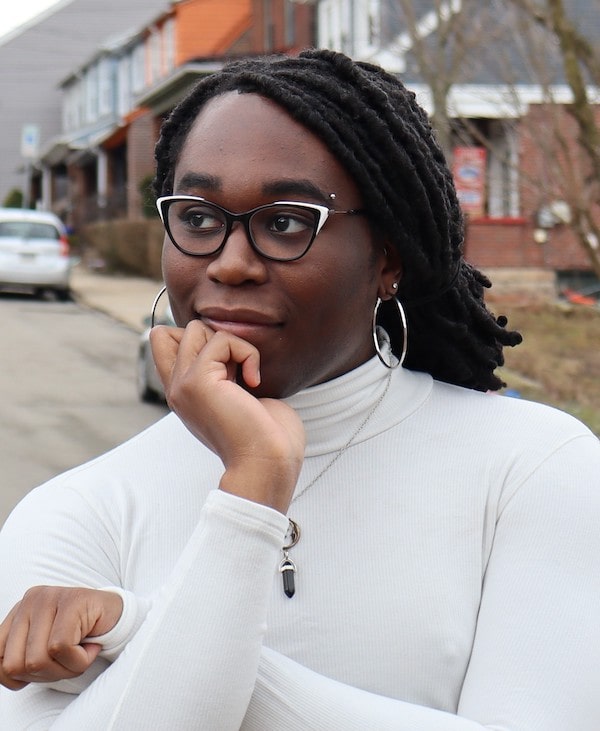Interdisciplinary Research for an Intersectional Student
Aurelia Augusta works to improve online experiences
Aurelia Augusta forms her best ideas during social lunches. The doctoral candidate in societal computing in the School of Computer Science calls herself a "people person," interested in the ways people interact with one another online.
Augusta's research transitioned seamlessly to a virtual environment throughout the pandemic, where she studied remotely from her Pittsburgh home.
"Prior to graduate school, I worked remotely for about a year, so I had that experience. But I'm a very social person," Augusta said. "I really missed hanging around and having those casual conversations after class, in the lab, over coffee."
"I'm getting a fundamentally bespoke education." —Aurelia Augusta
Subsequently, casual conversations have largely taken place in a virtual environment, and those are exactly the conversations Augusta studies as she applies her research to the impact of online harassment on marginalized groups. Augusta aims to provide guidance for improving content moderation.
"I am very focused on safety," Augusta said. "That includes security in the social sense of 'no one's going to come after me and attack me for who I am online' as well as people's ability to feel healthy and secure in the world."
CMU is one of the few schools to offer societal computing, which blends computer science with policy. Augusta takes a wide variety of courses to meet her goals.
"I'm getting a fundamentally bespoke education," Augusta said, who has taken courses in everything from rhetoric to economics, the politics of gender, and art classes
One of Augusta's advisers, Lorrie Cranor, FORE Systems Professor of Computer Science and of Engineering and Public Policy, and director of CMU’s CyLab Security and Privacy Institute, emphasized the importance of Augusta's background in computer science and work as a software developer prior to pursuing her Ph.D.
"Aurelia is now able to study policy analysis and social sciences to apply this research to her technical skillset," she said.
Cranor said Augusta's program of study is fundamentally interdisciplinary.
"We have a menu of options for our students' coursework where they choose from a wide variety of options,” Cranor said. “I'm interested in my students learning to do research and solve problems in areas that are important to them and will have an impact on the world."
The choice to enter an interdisciplinary program blending numerous fields of study felt logical for Augusta, who embodies the intersection of a number of identities.
"Being Black, a Nigerian immigrant, and then coming out as trans and understanding my identity as a trans woman has really informed my methodological rigor,” Augusta said. “Intersectionality is important to me in all areas."
Augusta said she sees the world through multiple lenses and keeps a central question in mind when she conducts her research: what does this mean, and who is this for? In the tech sector, she worked on trust and safety projects that ranged from implementing spam filters to developing tools to review scripts that volunteers use when phone or text banking in political campaign work. She lives the tensions and contradictions marginalized people experience online and realized graduate research would best equip her to make positive changes.
"I know what it's like to feel out of place," she said. "I find it very easy to sympathize and empathize with a lot of people."
Through her research, Augusta has found that marginalized people, specifically Black women and trans people, are systematically harassed online, and people in intersectional groups are much more frequently and severely harassed than others.
"The field just is not talking about this," Augusta said.
She hopes to apply her research to the cohort of professional content moderators, who overwhelmingly draw from economically and otherwise marginalized groups.
"People often say the internet needs more human moderators, but people just don't realize the conditions they're working under," Augusta said.
Moderators spend their days looking at and engaging with material that is frightening, disturbing and often harmful.
"They're doing this day in, day out, in a way that's traumatizing. I want to bring light to their work and include them in discussions of online violence," Augusta said. She is busy revising her work to submit for publication and for presentation at conferences.
"Between her skills and her passion for her chosen research areas, she is well positioned to do research that will make a difference in the world," Cranor said.
